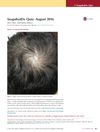 12 citations,
September 2017 in “Molecular and Cellular Endocrinology”
12 citations,
September 2017 in “Molecular and Cellular Endocrinology” Testosterone significantly affects sexual desire in both men and women, but its impact on women is more complex and influenced by psychological factors.
 December 2022 in “International journal of preventive, curative & community medicine”
December 2022 in “International journal of preventive, curative & community medicine” PCOS is a common hormonal disorder in women, causing symptoms like acne and irregular periods, and is managed with medication and lifestyle changes.
 101 citations,
April 1994 in “Baillière's clinical endocrinology and metabolism”
101 citations,
April 1994 in “Baillière's clinical endocrinology and metabolism” 5α-reductase is essential for male sexual development and its inhibitors have potential in treating various conditions related to hormone action.
 January 2018 in “Springer eBooks”
January 2018 in “Springer eBooks” The document says that early treatment of Acne Vulgaris is important to prevent scarring and that adult onset acne is common in women, often due to hormonal imbalances.
 11 citations,
July 2001 in “APMIS. Acta pathologica, microbiologica et immunologica Scandinavica./APMIS”
11 citations,
July 2001 in “APMIS. Acta pathologica, microbiologica et immunologica Scandinavica./APMIS” Estrogens are key for bone growth spurts in both boys and girls and affect growth into adulthood.
 November 2023 in “Bioorganic Chemistry”
November 2023 in “Bioorganic Chemistry” Drugs targeting the Androgen Receptor are effective for treating prostate cancer and other androgen-related conditions.
 12 citations,
August 2020 in “Annals of Oncology”
12 citations,
August 2020 in “Annals of Oncology” Androgen deprivation therapy might be better for preventing COVID-19 than treating it.
 43 citations,
April 2017 in “Experimental Dermatology”
43 citations,
April 2017 in “Experimental Dermatology” Female pattern hair loss has unclear causes, possibly involving genetics, hormones, and environment, and needs better treatments.
 July 2023 in “International journal of dermatology, venereology and leprosy sciences”
July 2023 in “International journal of dermatology, venereology and leprosy sciences” New treatments are being explored to slow or reverse hereditary hair loss.
 April 2023 in “Journal of Investigative Dermatology”
April 2023 in “Journal of Investigative Dermatology” The research found that certain factors in hair follicle cells control hair growth and development, and these could be used to create new treatments for hair loss.
 3 citations,
April 2015 in “American journal of biomedical sciences”
3 citations,
April 2015 in “American journal of biomedical sciences” Androgens play a key role in hair growth and disorders like baldness and excessive hairiness.
 118 citations,
September 2004 in “Clinics in Dermatology”
118 citations,
September 2004 in “Clinics in Dermatology” Hormones, especially androgens, play a big role in acne, but most acne sufferers don't have a hormone disorder. Hormonal treatments, including birth control pills, can be very effective for women whose acne doesn't improve with regular treatments.
 40 citations,
January 2013 in “Frontiers in Endocrinology”
40 citations,
January 2013 in “Frontiers in Endocrinology” Finger length ratios are not linked to the number of specific gene repeats affecting testosterone sensitivity.

Women with Polycystic Ovary Syndrome (PCOS) have a higher risk of developing type 2 diabetes due to insulin resistance.
2 citations,
January 2017 in “Endocrinology” Testosterone and its metabolites have varied effects on different body systems, especially during puberty.
 October 2021 in “The Egyptian Journal of Hospital Medicine ”
October 2021 in “The Egyptian Journal of Hospital Medicine ” Combination therapies work better than single treatments for atrophic acne scars.
 2 citations,
July 2018 in “Journal of Cosmetic Dermatology”
2 citations,
July 2018 in “Journal of Cosmetic Dermatology” Common latent viruses might contribute to male-pattern baldness by disrupting cell processes that normally suppress hair loss-related proteins.
May 2004 in “Biochimica et Biophysica Acta (BBA) - Molecular Basis of Disease” Vitamin E affects liver metabolism, enhancing stress resistance, reducing blood clotting, and altering hormone processing.

Alopecia areata, a type of hair loss, may be passed through T cells and has genetic links, while treatments vary in effectiveness. Male pattern baldness can be treated with finasteride and is influenced by androgens in hair follicles.
 1 citations,
March 2012 in “Journal of Dermatological Science”
1 citations,
March 2012 in “Journal of Dermatological Science” Testosterone, progesterone, and levonorgestrel change enzyme levels related to fat production in hamster skin, which could affect skin oil and acne.
 March 2021 in “Bioscientia medicina”
March 2021 in “Bioscientia medicina” Androgen affects oil production and hair growth in the skin.
 July 2016 in “Journal of Investigative Dermatology”
July 2016 in “Journal of Investigative Dermatology” Balding scalps show different gene expressions affecting hair growth compared to non-balding scalps.
 3 citations,
October 1995 in “International Journal of Dermatology”
3 citations,
October 1995 in “International Journal of Dermatology” Finasteride helps treat skin issues like acne and baldness by blocking testosterone conversion.
 26 citations,
November 1993 in “Progress in Neuro-psychopharmacology & Biological Psychiatry”
26 citations,
November 1993 in “Progress in Neuro-psychopharmacology & Biological Psychiatry” Treatment during development affects hormone balance and sexual behavior in male rats.
 1 citations,
November 1996 in “Journal of Cutaneous Medicine and Surgery”
1 citations,
November 1996 in “Journal of Cutaneous Medicine and Surgery” Hormones, especially androgens, play a key role in causing acne, and treatments like hormone control pills and hormone-blocking medications can help.
 June 2023 in “Journal of multidisciplinary sciences”
June 2023 in “Journal of multidisciplinary sciences” PCOS may increase the risk of certain cancers.
 186 citations,
July 1998 in “Journal of Cutaneous Medicine and Surgery”
186 citations,
July 1998 in “Journal of Cutaneous Medicine and Surgery” Shorter CAG repeats may cause hair and skin issues, while longer ones may link to acne.
 305 citations,
February 2007 in “Hormone and metabolic research”
305 citations,
February 2007 in “Hormone and metabolic research” Human skin makes sexual hormones that affect hair growth, skin health, and healing; too much can cause acne and hair loss, while treatments can manage these conditions.
Testosterone works in different ways, including direct interaction with its receptor, conversion to other hormones for specific effects on genitalia, hair, bones, and muscle, and changes in body fat and sexual function when low.
 76 citations,
January 2007 in “American Journal of Clinical Dermatology”
76 citations,
January 2007 in “American Journal of Clinical Dermatology” Women with PCOS often have skin problems like excessive hair, acne, hair loss, and dark patches, which can be treated with hormonal and non-hormonal therapies.



























